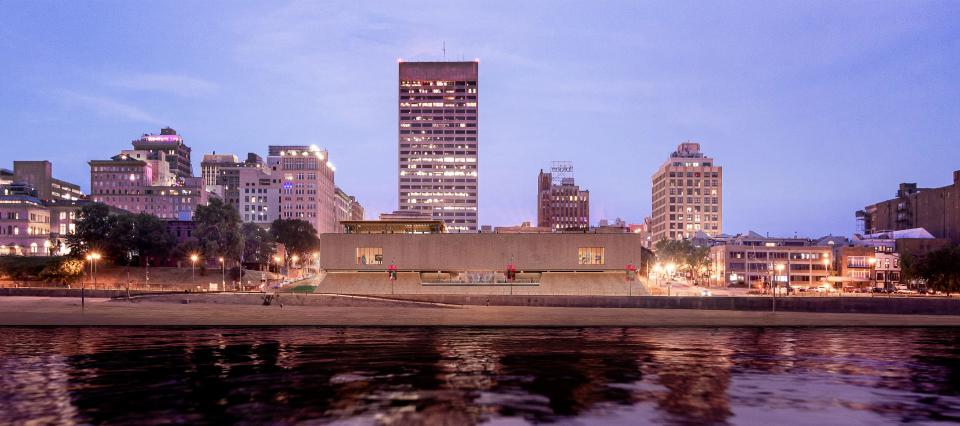Shelby County chancellor will decide whether to halt construction on new Brooks museum
After hours of testimony in Shelby County Chancery Court Wednesday, Chancellor Melanie Taylor Jefferson must decide whether to halt construction via an injunction at the future site of the Memphis Brooks Museum of Art in Downtown Memphis.
A group of Memphians who trace their ancestors to the founding of Memphis (Memphis was originally inhabited by the Chickasaw Nation before the tribe was forcibly removed) and the organization Friends for Our Riverfront want to see construction permanently halted at the site. The group claims 200 years of previous legal precedent has been misunderstood and the city does not have the authority to build the structure on a specific piece of land.
That piece of land is referred to as "the promenade," and it has been historically managed by the City of Memphis through an easement. According to the descendants of Memphis founders, who are referred to as the "heirs" in legal documents, the city should not be building on the property since it belongs to the citizens. Doing so, they argued, violates residents' property rights.
The land in question previously hosted a dilapidated fire station and a parking garage, both of which have since been destroyed as part of the project. The lawsuit said both structures, when they were still there, violated the easement.
"The removal of the fire station and parking garage created the first opportunity in over 70 years for the Heirs to legally enforce the easement without causing the removal of structures from the Bluff Site," the lawsuit said.
During testimony, attorneys for the museum countered the plaintiff's argument through witness testimony and sought to prove the opposite of the plaintiff's claims. Those witnesses included lead project managers and the lead architect, who testified that through an intentional design process, the future museum featured free public spaces akin to a city park.
Moving forward with the intended plans, they argued, actually created new opportunities for residents and visitors to enjoy a view of the river. Previously, the old fire station and parking garage blocked the view of the river from Front Street at Monroe Street.
Under the proposed plans for the new museum, part of Monroe Street would be closed off and redesigned to make the green spaces around the museum more accessible to all.
Those attorneys also pointed to previous and current developments in the area that the heirs and Friends for Our Riverfront did not object to. They also questioned the timing of the lawsuit, pointing out that the plans for the new Brooks have been public for a significant period of time.

Some of the developments attorneys for the Brooks referenced include the University of Memphis Cecil C. Humphreys School of Law, part of the Bass Pro Shop Pyramid's parking lot, the Mud Island River Park garage, the Cossitt Library and a portion of the Cannon Center for the Performing Arts.
Jeff Feibelman, one of the attorneys representing the city and Brooks Museum, also pointed to former Memphis Mayor Watkins Overton, who was also a descendant of one of the city's founders, advocating to build a parking structure on the area in question while in office.
One of the heirs who testified in court Wednesday, Virginia Overton-McLean, said she wanted to see respect for the promenade exhibited in a similar way to what Chatanooga has done — which she said allows for views of the riverfront to be enjoyed without buildings obstructing it.
More: Brooks Museum hopes Monroe Plaza will reconnect Downtown Memphis assets
Feibelman, in his cross-examination, pointed to an art museum and aquarium being located along the river there. Overton-McLean said the way Chattanooga structured its riverfront was different from what the Brooks Museum would do.
Attorneys for the heirs also sought to dispute the cost of halting construction until the matter is legally sorted out. Previously, plaintiffs were told they would have to put up a bond to cover the costs of halting construction until that matter is decided permanently.
Delaying the construction for months, the defendants argued, would cost the Brooks millions.
Taylor Jefferson did not indicate when she would make her decision.
Micaela Watts is a reporter for The Commercial Appeal covering issues tied to healthcare, resource access, and equity. She can be reached at micaela.watts@commercialappeal.com.
Lucas Finton covers the criminal justice system for The Commercial Appeal. He can be reached at lucas.finton@commercialappeal.com.
This article originally appeared on Memphis Commercial Appeal: Heirs sue to stop Memphis Brooks Museum of Art from being built Downtown

